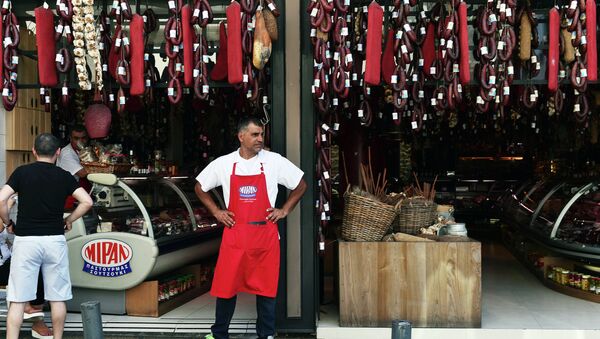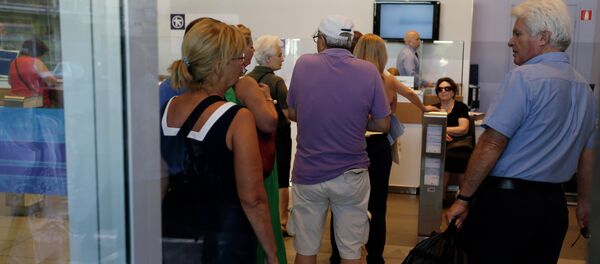As part of 'confidence building' measures, introduced by the Greek government on the back on negotiations with Eurozone creditors, an existing sales tax was expanded and increased from 13 percent to 23 percent.
The wide-ranging tax applies to the sale of various products and services such as coffee, restaurants sales, various meat products, language schools and even ferries to the Greek islands.
As a result, it has significantly increased the cost of living for many Greeks, who have already suffered from five years of austerity, plus the turmoil and uncertainty of the past few weeks, which saw the country's banks close, and capital controls introduced.
Banks reopen, taxes rise as Greece pays billions to creditors http://t.co/w5GgNNxZ6X #photo by @lgouliam pic.twitter.com/e5KoTSGhE1
— Agence France-Presse (@AFP) July 20, 2015
While many economists and politicians have previously said that applying new austerity measures will only exacerbate Greece's unemployment and standard of living problems, the tax's introduction is already showing real signs of making life tougher for locals.
Many business owners fear they may have to close due to the increase in taxes, with many saying they aren't willing to increase prices for fear of losing what little business they have.
Cost of living goes up in #Greece and #TOI highlights cost of #Condoms going up! Wow editorial wow…… pic.twitter.com/h2Cwtc7sFc
— manoj (@ManojG7) July 21, 2015
Fears Greeks Will Be Pushed to the Far-Right
Meanwhile, on top of purely economic and financial impacts, many have concerns over the long-term damage harsh austerity will have on Greek society, with former finance minister Yanis Varoufakis warning that many Greeks will be pushed towards far-right movements as a result of the creditors austerity demands.
Varoufakis outlines how Greece has now given all power & national control to the EU. The people were right #OXI http://t.co/OpPbAncwaw
— Peter Sotiropoulos (@sotirops) July 21, 2015
During an interview with Australian public broadcaster the ABC last week, Varoufakis said that Greece's highly controversial far-right party, the Golden Dawn could "inherit the mantle of the anti-austerity drive, tragically," as a result of a continuation of harsh austerity measures.
"If our party Syriza, that has cultivated so much hope in Greece — to the extent that we managed to score 61.5% in the recent referendum — if we betray this hope and if we bow our heads to this new form of postmodern occupation, then I cannot see any other possible outcome than the further strengthening of Golden Dawn."
Golden Dawn strengthened by + austerity, Varoufakis warns. Says #Greece will fall to far right http://t.co/QHvpfOpvZF pic.twitter.com/38FtGgf8Xq
— Sid Shniad (@SidShniad) July 15, 2015
Greece has arguably suffered more than any other European country as a result of austerity measures attached to the country's 2010 bailout from creditors, the Eurozone, the European Central Bank (ECB) and the International Monetary Fund (IMF) — collectively known as the Troika.
More than a quarter of the Greek workforce is unemployed, while the youth unemployment rate has increased slightly in recent times to sit at 51 percent.
Greece has also experienced a 35 percent increase in the country's suicide rate since austerity measures were introduced 2011, with a study headed by academic George Rachiotis making a direct correlation between the rate and austerity.
#Austerity kills. #Greece: 35% jump in suicide rate during first 2 years of troika occupation. http://t.co/ybjvbG53oM pic.twitter.com/7XW1NwTstT
— rui borges (@homo_viator) July 19, 2015
"We found a clear increase in suicides among persons of working age, coinciding with austerity measures. These findings corroborate concerns that increased suicide risk in Greece is a health hazard associated with austerity measures."



